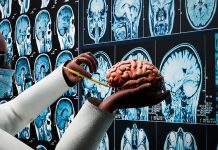
A new study from scientists at the University of California, Irvine, has revealed a surprising cause of small brain bleeds that could change how we understand age-related brain conditions. Published in the Journal of Neuroinflammation, the research suggests that old or damaged red blood cells may trigger tiny brain hemorrhages, also known as cerebral microbleeds.
Until now, brain bleeds were thought to result mostly from damaged or weakened blood vessels, especially in people with high blood pressure or other vascular problems. But this new research points to a different, unexpected cause: the red blood cells themselves.
The research team, led by Dr. Mark Fisher and Dr. Xiangmin Xu, looked at how aging red blood cells interact with the tiny blood vessels in the brain, called capillaries. These capillaries are vital for delivering oxygen and nutrients to brain cells but are also very delicate and sensitive to damage.
To simulate aging in red blood cells, the scientists exposed them to oxidative stress, which creates damage similar to what happens naturally over time in the body. They then labeled these damaged cells with fluorescent markers and injected them into mice so they could see what happened inside the brain.
What they found was both surprising and important. The aged red blood cells became stuck in the brain’s capillaries. Once trapped, they triggered inflammation and eventually led to small brain hemorrhages. These events were not caused by blood vessels breaking on their own, but rather by a chain reaction involving the brain’s own immune cells.
These immune cells, called microglia, usually help clean up debris and protect brain tissue. But in this case, when the microglia tried to remove the stuck red blood cells, they accidentally set off inflammation that damaged nearby tissues and caused bleeding.
This process could help explain why cerebral microbleeds become more common as people age, and why they are often seen in people with conditions like high blood pressure, stroke, or Alzheimer’s disease.
Dr. Fisher explained that this study “highlights the role of red blood cell damage in the development of brain hemorrhages,” adding that it could lead to new ways of preventing or treating these problems.
Cerebral microbleeds may be small, but they are not harmless. Over time, they can affect thinking, memory, and brain function. They are linked to diseases like Alzheimer’s and can make the brain more vulnerable to other types of strokes.
This new understanding of how they form opens up fresh opportunities for medical research. If doctors can find ways to keep red blood cells healthy for longer, or help the brain’s immune system clear them without triggering inflammation, it may be possible to reduce the risk of brain bleeds and their long-term effects.
The researchers are now planning to study how the brain handles damaged red blood cells in more detail, and whether this process plays a role in other types of stroke or brain damage. Their goal is to find new treatment targets that go beyond blood pressure control and tackle the underlying causes of inflammation in the brain.
In the meantime, staying healthy through lifestyle habits remains important. Eating a balanced diet—such as the Mediterranean diet—and including brain-friendly foods like wild blueberries may support both heart and brain health. These lifestyle choices can help reduce oxidative stress, which contributes to both blood cell aging and inflammation.
This new discovery brings hope for better prevention and care for older adults and others at risk of stroke and dementia. It’s a reminder of how complex and connected our bodies are—and how small changes at the cellular level can have a big impact on brain health.
If you care about stroke, please read studies that diets high in flavonoids could help reduce stroke risk, and MIND diet could slow down cognitive decline after stroke.
For more health information, please see recent studies about antioxidants that could help reduce the risk of dementia, and tea and coffee may help lower your risk of stroke, dementia.
Copyright © 2025 Knowridge Science Report. All rights reserved.



